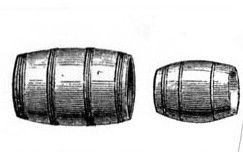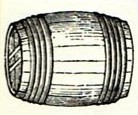An Appreciation of Laurie Colwin.
We never knew Laurie Colwin except through her writing; she died of heart failure in her sleep at the age of 48 back in 1992. We were not even familiar with her writing until the summer of 2007, when the Editor stumbled upon a used copy of her first collection of kitchen essays, Home Cooking (New York 1988), at the wonderful branch of Myopic Books in Wakefield, Rhode Island--more proof that bookshops trump the internet, despite its charms, for happy surprises. The book included reference to Jane Grigson, so a sale was made.
 By any measure this was a remarkable woman. She wrote novels and stories, translated Isaac Bashevis Singer and held down a column at Gourmet . Colwin was no dry intellect; she managed to sustain a warm life at home with her husband and daughter, and in private and public with their big, close circle of friends. Some of them have described her as relishing a fight and tending to the acerbic: she probably did not suffer fools and includes the disarming, not to say charming, confession of occasional bad behavior at boozy parties. They must have been fun.
By any measure this was a remarkable woman. She wrote novels and stories, translated Isaac Bashevis Singer and held down a column at Gourmet . Colwin was no dry intellect; she managed to sustain a warm life at home with her husband and daughter, and in private and public with their big, close circle of friends. Some of them have described her as relishing a fight and tending to the acerbic: she probably did not suffer fools and includes the disarming, not to say charming, confession of occasional bad behavior at boozy parties. They must have been fun.
Amazon.com describes Colwin as a “talented and accessible writer” and that sounds about right; the style is breezy, lighthearted, knowing. The Jane Austen brigades adored her, and she was compared to Austen for her accessible literacy and easy domesticity. Colwin’s fiction is more insightful than difficult, and if it lacks a certain depth it enthralled her readers for its immediacy and compassion. They saw themselves and their dilemmas in her work.
Our interest lies in Colwin’s writing about food; a second collection of essays, More Home Cooking , appeared after her death, in 1993. This is the first paragraph from the essay “English Food” in Home Cooking :
"If you work up the courage to confess that you like English food people are apt to sneer and tell you that it is impossible to get a decent meal in the British Isles and that the English know nothing about cooking. Even the English, some of whom have been brought up on a dread substance known as nursery food, often feel this way."
This attitude to English food sounds remarkably contemporary, at least in the United States (the British have learned to cook and like their food; the proliferation of British restaurants serving English cuisine serves notice); aquaintances of the Editor, including her urbane doctor, the principal of an investment firm and a museum director react with disbelief at the mention of English food and derision at the protestation of its quality. Colwin of course was braver than the Editor; she was writing before TV celebrity chefs from Britain had conquered the Food Network and Travel Channel. Their dishes are not particularly British but the chefs can cook.
In her travels Colwin was adventurous enough to discover the thrilling truth and talented enough to describe it. For example, “[i]n England you could get chicken that tasted like chicken, and gooseberries and tomatoes and those long pale green cucumbers with a silvery taste. In specialty shops there were raised pies: veal, ham and egg, chicken, and cottage pie.” This was just not what Americans wanted to believe.
Colwin was so brave that she even attacked the cherished American faith in the horror of haggis in "English Food" (the dish of course is not English, but the essay’s title is hers):
"To divert me from my endless meanderings in food stores, Richard took me on a trip to the Highlands of Scotland, where we were assured we would never find anything edible at all. On a freezing night…we decided to order haggis, as a joke. Haggis is the national dish of Scotland. It is composed of minced liver and oatmeal (barley is a variation) in a savory sauce, stuck into a sheep’s stomach and boiled....The haggis was brought to our table in its stomach bag which was slashed right open before our eyes. Out slid the contents, which gave off a very delicious smell. To our amazement, we loved it. It was rich, savory, just right for a cold place...."
 This is feathery material, and may not earn top marks in advanced writing class, but it also is light reading in the best tradition, for nights when an extra whisky has precluded Tolstoy but your vanishing portfolio prevents sleep anyway. We share Colwin’s excitement and believe her fervor. We want to go find this food in this cold place. Her prose my be lighthearted but has the ring of conviction and power to persuade.
This is feathery material, and may not earn top marks in advanced writing class, but it also is light reading in the best tradition, for nights when an extra whisky has precluded Tolstoy but your vanishing portfolio prevents sleep anyway. We share Colwin’s excitement and believe her fervor. We want to go find this food in this cold place. Her prose my be lighthearted but has the ring of conviction and power to persuade.
We disagree on some things, a good sign; by all accounts Colwin would have liked that. She roasts chicken slowly on low heat; we blast it fast in a hot oven; we do like rare duck and lamb. There are mistakes; the “classic tome that contains everything anyone needs to know about New England cooking” (it does not) is The New England Yankee Cookbook by Imogene Wolcott, not Yankee Cooking by Imogen Walcott, but they are forgiven.
She likes the right cookbooks. Her “copies of Jane Grigson’s English Food and Mrs. Florence White’s Good Things in England are falling apart;” ours are too. She also relies on Edna Lewis, Marcella Hazan, Elizabeth David, “the numerous contributors to the Charleston Receipts ” and Margaret Costa; not bad, and indicative of an instinctive grasp of the nexus between the food of Britain and the American South to boot.
Colwin likes beets, boiled beef, Caribbean black cake, chutney, coffee, gingerbread and kitchen ‘help’ from her little girl. She has advice about navigating the shoals of rented house cooking and feeding the fussy and, mercifully, she hates to grill. Some of the essays include recipes, and they are sound. Try the striped bass baked with bacon, the tomato pie and that black cake.
Most of Colwin’s food essays do not actually involve Britain but British food was an abiding interest; she read and reread English cookbooks and “such classics as Consuming Passions by Philippa Pullar, An Englishman’s Food by Drummond and Wilbraham, as well as Food in E ngland and Lost Country Life by Dorothy Hartley.” These are wonderful books.
We would, however, like Colwin on food if she never mentioned Britain. Any New York intellectual gets our affection if she is self-aware and self-deprecating enough to confide that “[u]nlike some people who like to go out, I love to stay home.... and in the days when my friends were happily traveling to Bolivia and Nepal, I was ashamed to admit that what I liked best was hanging around the house.”
Colwin addressed the Radcliffe Culinary Friends about the pleasure of ordinary food and the sanctity of personal taste just before her death. Her advice to the students makes an appropriate coda to this brief appreciation of her life: “It always seems to me that cooking is like love. You don’t have to be particularly beautiful or very glamorous, or even very exciting to fall in love. You just have to be interested in it. It’s the same thing with food. You do not have to be a genius.” We wonder what the kids thought, and hope they took a chance on both counts. What a loss.

